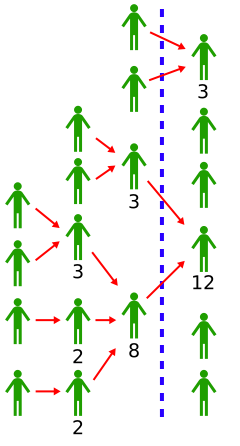
Citizen deliberative councils, participatory budgeting, the Occupy movement’s consensus decision making: These are all experiments in more participatory forms of democracy.
Technologies can support these types of experiments, from the keypad and CoVision technologies used by AmericaSpeaks in deliberative dialog and polling to the geographic information systems used by the Madrona platform for participatory spatial planning.
With the rise of the German Pirate Party (see NYT and NPR reports), so-called liquid democracy platforms for proxy voting (or delegated voting) are finally getting some real-world testing and development.
Here’s how Yale’s Bryan Ford describes the concept in his 2002 paper, “Delegative Democracy” (pdf):
Delegative democracy combines the best elements of direct and representative democracy by replacing artificially imposed representation structures with an adaptive structure founded on real personal and group trust relationships.
The platform used by the Pirate Party is called Liquid Feedback, but similar platforms have been around for a while. One early effort was Smartocracy, described here in a 2007 paper:
Smartocracy is a social software system for collective decision making. The system is composed of a social network that links individuals to those they trust to make good decisions and a decision network that links individuals to their voted-on solutions.
An introduction to the German platform appears in a May 2012 TechPresident report, “How the German Pirate Party’s “Liquid Democracy” Works”:
Liquid Feedback is about competition and decision-making. Any of the 6,000 members that use it can propose a policy. If the proposal picks up a 10 percent quorum within a set period, such as a week, it becomes the focus of an almost ‘gamified’ revision period. Any member can also set up an alternative proposal, and over the ensuing few weeks these rival versions battle it out, with members voting their favorites up or down. …
Each member has one vote, but most are not interested in marking up endless reams of policy papers. So the system allows every vote to be entrusted to another member – for everything, or for certain topics or specific proposals, or not at all. What’s more, the person who has been delegated the votes of others can then re-delegate all those votes, plus their own, to someone else. … Every delegated vote can be reclaimed at any time, so no high-flying Pirate can operate without a continuous mandate.
Author Steven Johnson picks up the liquid meme in his new book Future Perfect: The Case for Progress in a Networked Age:
The interesting thing about liquid democracies is that we already use this proxy strategy in our more casual lifestyle decisions. When you’re trying to decide where to have dinner, you call up your foodie friend for advice, but there’s another friend whose taste in music has never failed you, and yet another who is always coming up with great new novels to read. There’s a natural division of labor that emerges in networks of friends or acquaintances; not all recommendations are created equal in the world of culture, because individual people vary in their tastes and expertise. When we make cultural decisions, we often offload those choices to the local experts in our network. Liquid democracies simply apply the same principle to political decisions.
Perhaps the most critical advantage of liquid democracies and participatory budgets lies in the way they expand the space of civic participation. The local experts who “club together” votes from their friends and neighbors occupy a new zone of engagement, somewhere between citizen and politician. They don’t have to become full-time legislators for their particular expertise or passion to be useful to the community.
Sure enough and as Johnson describes, one “local expert,” a non-politician from Bamberg, Germany, has played a significant role among the Pirates, according to a March 2012 profile in SPIEGEL ONLINE, “Web Platform Makes Professor Most Powerful Pirate”:
Martin Haase doesn’t have to give any hard-hitting speeches at party conferences, nor does he spend time at board meetings or in back rooms to hone his power. When the 49-year-old professor wants to engage in politics, he just opens his laptop and logs in to Liquid Feedback, the Pirate Party’s online platform for discussing and voting on political proposals.
Image from Wikimedia Commons

